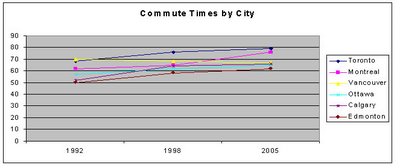Transit 1
StatsCan released a study on commuting a couple of weeks ago.
Unfortunately, the data behind the study isn't really detailed enough to say much more than that commute times are going up, especially in the cities, and it still takes a fair bit longer to get to work by transit than it does by car. None of which is particularly surprising, but it's nice to have some data to back up common perceptions so that we know this isn't, for example, the same situation as with crime, where a sensationalist media has created a widespread public impression of rising crime rates during a period where crime rates are actually declining.
Key findings
Longer commutes overall:
Longer travel time for people on transit:
One thing I did find interesting in the study was the anomalous behavior of Vancouver with respect to other large cities. Take a look at this chart, and notice that one of the lines is moving in the opposite direction from the others - that line is Vancouver where commute times have been marginally decreasing over the last decade and a bit.

As you can see from this chart from the UBC Centre for Urban Economics and Real Estate, it's not that the other cities have been growing more than Vancouver so it seems like Vancouver must be doing something right with regard to commute times, something other cities could learn from potentially.
As for what that is, I couldn't really say for sure. Vancouver is known for it's policy of not building new highways so perhaps that is helping. Vancouver is also one of the few cities which has built a major transit extension (the Millenium Line) since 1992 so maybe that has made a difference. Vancouver also does a pretty good job at increasing residential density downtown and near transit hubs so maybe that has made a difference. Perhaps it is just that geographic barriers (combined with the agricultural land reserve) is making it hard for sprawl to sprawl quite as quickly. It seems like it is worth investigating further at any rate, and suggests that efforts by other cities to imitate some of Vancouver's policies (such as the Liberals in Ontario creating a greenbelt and de-emphasizing new highway construction) might end up leading to lower commute times.
Once Vancouver finishes the RAV (Canada) line, and the Northeast Light Rail (Evergreen) Expansion, and once the Golden Ears bridge is built, I wouldn't be surprised to see the downward trend of Vancouver commuting times continue.
Unfortunately, the data behind the study isn't really detailed enough to say much more than that commute times are going up, especially in the cities, and it still takes a fair bit longer to get to work by transit than it does by car. None of which is particularly surprising, but it's nice to have some data to back up common perceptions so that we know this isn't, for example, the same situation as with crime, where a sensationalist media has created a widespread public impression of rising crime rates during a period where crime rates are actually declining.
Key findings
Longer commutes overall:
"In 2005, commuters spent an average of 63 minutes on the round trip between their place of residence and their workplace. By comparison, the average time was 54 minutes round trip in 1992 and 59 minutes in 1998."
Longer travel time for people on transit:
"All things being equal, commuters who use public transit to get to work (without also using an automobile) spend an average of 41 minutes more on their daily commute than those using an automobile."
"Above all, the study shows that a sizable gap remains between the two modes from the standpoint of travel times. It is therefore not surprising that despite higher fuel costs and increased environmental concerns, most workers continue to use mainly their automobile to get to work."
One thing I did find interesting in the study was the anomalous behavior of Vancouver with respect to other large cities. Take a look at this chart, and notice that one of the lines is moving in the opposite direction from the others - that line is Vancouver where commute times have been marginally decreasing over the last decade and a bit.

As you can see from this chart from the UBC Centre for Urban Economics and Real Estate, it's not that the other cities have been growing more than Vancouver so it seems like Vancouver must be doing something right with regard to commute times, something other cities could learn from potentially.
As for what that is, I couldn't really say for sure. Vancouver is known for it's policy of not building new highways so perhaps that is helping. Vancouver is also one of the few cities which has built a major transit extension (the Millenium Line) since 1992 so maybe that has made a difference. Vancouver also does a pretty good job at increasing residential density downtown and near transit hubs so maybe that has made a difference. Perhaps it is just that geographic barriers (combined with the agricultural land reserve) is making it hard for sprawl to sprawl quite as quickly. It seems like it is worth investigating further at any rate, and suggests that efforts by other cities to imitate some of Vancouver's policies (such as the Liberals in Ontario creating a greenbelt and de-emphasizing new highway construction) might end up leading to lower commute times.
Once Vancouver finishes the RAV (Canada) line, and the Northeast Light Rail (Evergreen) Expansion, and once the Golden Ears bridge is built, I wouldn't be surprised to see the downward trend of Vancouver commuting times continue.


0 Comments:
Post a Comment
<< Home